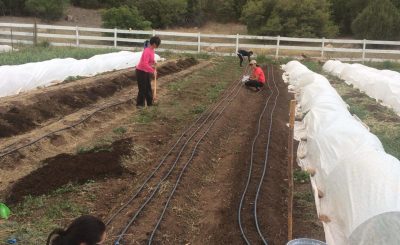By Bo Hou ’21, China
Five UWC-USA students unable to return home due to the COVID-19 pandemic returned to the Montezuma campus on May 19 to work on the farm. All had been staying with host families since leaving campus in mid-March.
Kritim Krishna Rijal ‘20, Nepal; Milania Lucia Soares da Costa ‘20, Timor-Leste; Paula Fabiana Ramirez Orozco ‘20, Ecuador; Bo Hou ’21, China; and Daniela Rivas Clavel ‘21, El Salvador are living in dean of students Naomi Swinton’s three-bedroom home.
Most cannot go back home because their countries are locked down.
“I plan to stay here until the border back home opens because until then, I don’t have another place to be,” said Kritim.
“If everything can be normal again before or during July, I will travel back to my country. I think I like the farm. Also living with people of similar age as I am is fun,” Milania said.
Residential Life proposed the idea to the UWC-USA Strategic Leadership Team.
“We typically have had farm interns over the summer, usually not students or recent alumni though,” Naomi said. “We wanted to be sure to be able to continue to distribute produce locally in the community as many people benefit from the donations of fresh vegetables and fruit in town.”
The students work on the farm from 8 to 11 a.m. and then 7 to 8 p.m. five days a week. While at the farm, students are supervised by farm manager Adrian Carter and environment systems teacher Ben Gillock. Resident coordinator Alex Curtiss oversees students when they are away from the farm.
Students are expected to stay on campus except for emergencies or chaperoned trips, wear masks in public, wash hands regularly and report any health symptoms immediately. They also are expected to uphold the UWC Code of Conduct, and consider safety and responsibility as they carry out their tasks on campus, Naomi said.
Kritim talked about his experience on the farm.
“A lot of things are new, especially because I have not been involved in the farm, at least not for a while, but it is pretty interesting,” he said. “Some of the chores are challenging, while others are comparatively easier. The overall experience however is pretty satisfying.”
Students make breakfast and dinner, and through the end of May, got lunches from the cafeteria.
“It is usually good,” Kritim said. “But even if we get the food from there, we have to bring it to our place and eat it.”
Besides the cafeteria, all castle rooms and other dorms are locked.
“We can only access the library and IT Center,” Milania said. “Other than that (access) is not allowed by the school, but (we have access to) the castle only for taking lunch food.”
Students are enjoying their time on campus.
“It was a nice opportunity to meet some friends and faculty,” Kritim said.
“I can access the library, so I read for fun,” Milania added. “And there is a projector to watch movies.”

